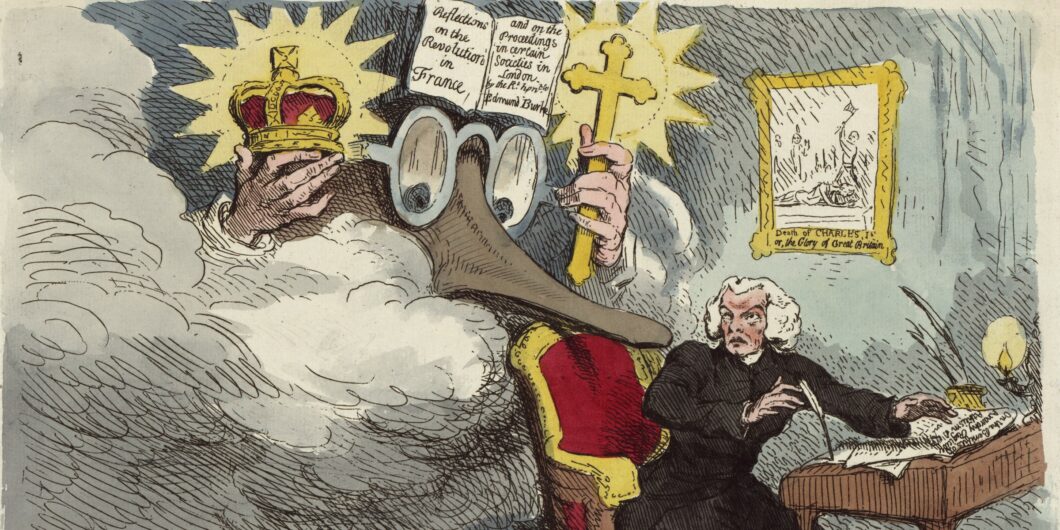A "Religion of No Efficacy"
During his first few years in England, Edmund Burke compiled essay sketches and fragments in a notebook published only in the mid-twentieth century. One of the entries in that notebook, possibly co-written with his distant cousin William Burke, is entitled “Religion of No Efficacy Considered as a State Engine.” It is fairly straightforward and not particularly developed—it takes up a mere three pages of the published version. The pithy insight it contains, however, is notably lacking in many contemporary calls for more religion in our politics.
The premise is simple: Religion has salutary benefits for social and political life. But once it is seen primarily in a political context—when it becomes merely a “state engine”—it fails to provide those benefits.
If you attempt to make the end of Religion to be its Utility to human Society, to make it only a sort of supplement to the Law, and insist principally upon this topic, as is very common to do, you then change its principle of Operation, which consists on Views beyond this Life, to a consideration of another kind, and of an inferior kind.
Burke certainly had in his sights “enlightened” clergy who were uncomfortable defending the faith on the basis of the old dogmas and so instead stressed its moral dimension and necessity for peaceful civil life. But he may also have had in mind utilitarian and political understandings of pagan religions. And the general reflection on the outward, social effects can be useful in many contexts.
If he meant that one ought never to speak of the social benefits of religion, there would be ample evidence that he abandoned this view later in life, when he had much to say on the subject. But there’s no reason to think that’s what he had in mind. Rather, his comment is about the way religion is publicly presented and understood.
The social benefits of religion come precisely because it is something that transcends the political, and they depend on the manner in which religion is approached by the people. When we come to think that eternal rewards and punishments are aimed primarily at the immediate, political “purposes of a moment,” they become less impressive to us: “We cool immediately, the Springs are seen; we value ourselves on the Discovery; we cast Religion to the Vulgar and lose all restraint.”
In his later life, as a staunch defender of the established church, Burke would identify the social benefit of religion as its ability to overawe all other social calculations and considerations. It reminds us that all we say and do has cosmic significance. Placing all human endeavors next to the sublimity of God, as he noted in his Philosophical Enquiry, has the effect of diminishing our opinion of ourselves and our capabilities: “Whilst we contemplate so vast an object, under the arm, as it were, of almighty power, and invested upon every side with omnipresence, we shrink into the minuteness of our own nature, and are, in a manner, annihilated before him.”
Even as he spoke of a “consecrated” state, Burke could also say without contradiction that “politics and the pulpit are terms that have little agreement.”
Religion, then, could have the effect of dampening experimental and revolutionary fervor—what reader of the Book of Job, for instance, could ever dare to say that “we have it in our power to begin the world over again”? If political authority is seen as part of God’s providential order, we will “look with horror on those children of their country who are prompt rashly to hack that aged parent to pieces, and put him into the kettle of magicians.”
But importantly, it also ought to have the same humbling effect on those who exercise that political authority: “All persons possessing any portion of power ought to be strongly and awefully impressed with an idea that they act in trust; and that they are to account for their conduct in that trust to the one great master, author and founder of society.” This manifested in “politic caution” and a “moral timidity” (hardly the language of today’s politics) when pursuing any great political undertaking. The one who exercises power must even “fear himself.”
The political benefits of religion, then, rely on the humility that true religion ought to produce. And, as the young Burke suggested, it could only come as a side effect of a religion that was not focused primarily on political and social affairs. To the extent that religion is seen as (or actually becomes) a political project, it no longer forces us to “contemplate so vast an object” that we “shrink into the minuteness of our own nature.” It presents us, rather, with just another human social project. So even as he spoke of a “consecrated” state, Burke could also say without contradiction that “politics and the pulpit are terms that have little agreement. No sound ought to be heard in the church but the healing voice of Christian charity.” Should the pulpit ever come to be understood as a political soapbox, it would lose its salutary social effects. “The Springs are seen.”
Not only does a politicized religion fail to carry with it the benefits of the genuine article, it actively encourages the opposite tendencies. When religion is treated as a “state engine,” he says, “we value ourselves on the Discovery; we cast Religion to the Vulgar.” Instead of diminishing ourselves in our own eyes, it elevates us, as those chosen to wield a sword of righteousness. We have diagnosed society, identified its moral failings, and prescribed the cure to “the vulgar” who need it. God does not overawe us and our political plans, but is made to be a promoter of them and guarantor of their success.
As Burke would eloquently argue throughout his life, unity around a genuine religious tradition can have great social benefits insofar as it places politics in a context that reveals its own insufficiency and limits. But his observations are a reminder that the question of public religion is much more complicated than a matter of whether, abstractly, religion is good for social life. Also at stake are the substantive teachings of the religion itself, the public perception of it, and its effects on the souls of those wielding it.
Minds shaped by the pulpit may, depending on what is taught there, lead to better citizens and better statesmen. But pulpits focused mostly on political matters are necessarily degraded from their true purpose and therefore self-defeating. Such religion is easily reduced to a convenient civic morality that flatters, rather than diminishes our ambitions for political and social endeavors. When that happens, religion hasn’t consecrated the state, but the state has humiliated religion by rendering it just another tool put to use in human affairs.
It’s not clear that the religious right of the last century, or those voices on the right today rhetorically pushing for a more robust public religion, appreciate the sort of distinction Burke describes. Do politicians in pulpits, megachurch campaign rallies, Bible photo-ops, and governors “claiming” their states for Jesus make it more likely that the American public will express “humility and gratitude before God,” as the National Conservatives hope? Or do such public displays merely signal all the more clearly that the religion being practiced is a creation of partisan politics; a human instrument crafted “for the purposes of a moment”; a “state engine” that will be of no efficacy?
Any opinions expressed are the author’s and do not necessarily reflect those of Liberty Fund.



